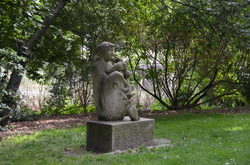
The King, Arindal, was thrown out of fairyland after breaking his vow to not ask her name before eight years. Then, he is allowed to see her again, just at the same time his country is threatened by the enemy, the Queen Lora, his sister is losing, convincingly sung by Eun Yee You. His loyal friends urge him to return. He arrives back and heartens his troops, while the Queen's fiance Morald, sung by Mathias Hausmann returns to fight.
But Fairydom thinks he hasn't been tried enough so he has to swear not to curse Ada the next day. He swears he'll be true, but the nasty fairies connive with the evil Harold and accuse Ada of being a witch that throws her children into the flames. So of course the King curses Ada and she's turned into a stone. So the King becomes maddened by his loss, even though his children are returned safely.
Eventually, the fairies (Zemina sung by Magdalena Hinterdobler and Farzana sung by Jean Broekhuizen) have pity on him (and everyone else) and lead him off to win his wife back. He has to fight awful robot men which he does, but still she is locked in stone, so he sings her the best song ever and she is returned. By this he wins immortality and his family and wife back, and he gives up his kingship so his sister and her fiance can marry and continue being King and Queen. The moral appears to be that one must be very careful about what one commits to do.
The tale is rather complicated *See the libretto) so the five hour staging of the show by Leipzig Oper is well understandable as necessary. The seats at Leipzig Oper is very comfortable and with room between seat columns for people to walk past while you sit, the acoustics very nice. The twenty-minute breaks serve to keep you willing to listen.
The way the Leipzig Oper staged the play seemed to use fantasy on four levels of metaphor--
1) the fantasy world of fairies
2) the fantasy world we create when we listen to music or read literature
3) the way love creates a fantasy world where we live
4) what we put into our lives and imagination comes back to us in reality
In the opening of the opera, the King is with his family and friends over dinner when he turns on the music. The King is a very annoying character who is wishy-washy and won't fight for his country or stick to his avowal of love, giving his word to things he doesn't mean to keep. The King, Arindal, was played by Arnold Bezuyan and it was a bit frustrating to see him hold back and stay in character.
In the real life in which he lives, he yearns for the true fantasy love of the opera and while he listens, his whole family escapes. As he listens to the tale unfold, he's pushed and pushed to commit more to his fantasy world, to enter into it and imagine himself taking over, making the fantasy into real life. This is how all authors want to work with their audience, pulling them in to the role further and further and gave the entire presentation a very contemporary feel.
 RSS Feed
RSS Feed